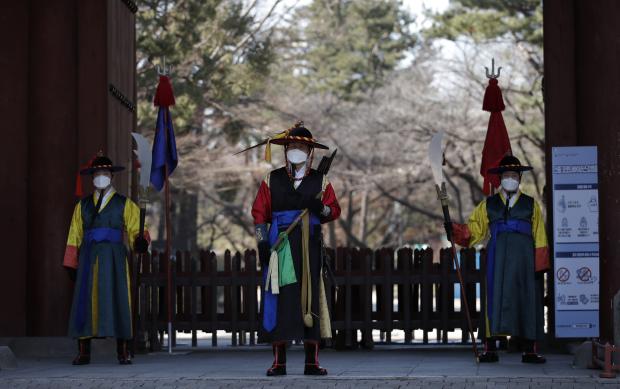DFA asks travelers to delay Korea trips

Officials wearing traditional guard uniforms and masks stand in front of the Deoksu palace in downtown Seoul, South Korea, Sunday, Feb. 23, 2020. South Korea and China both reported a rise in new virus cases on Sunday, as the South Korean prime minister warned that the fast-spreading outbreak linked to a local church and a hospital in the country’s southeast had entered a “more grave stage.” (Photo by LEE JIN-MAN / AP)
MANILA, Philippines — The Department of Foreign Affairs (DFA) is discouraging “nonessential travel” to South Korea, which is battling an outbreak of the new coronavirus that is spreading from China.
South Korea reported 161 new cases on Monday, bringing the total to 763 cases. It recorded two more deaths, raising the toll to seven.
“Currently, there is no travel ban imposed on Filipinos traveling to South Korea but travelers are cautioned to delay nonessential travel to the country as a precaution,” the DFA said in an advisory Sunday night.
Task force meeting
Assistant Health Secretary Maria Rosario Vergeire told a news briefing on Monday that the Inter-Agency Task Force for the Management of Emerging Infectious Diseases would discuss the situation in South Korea in a meeting on Wednesday and decide whether to impose a ban on travel to that country.
Vergeire said the task force would also discuss whether to ban travel to other countries with confirmed cases of the new coronavirus such as Singapore.
Article continues after this advertisementCurrently, the government bans travel to and from China and its two administrative regions—Hong Kong and Macau—to keep the virus out of the Philippines. Exempted from the ban are Filipino migrant workers, students, foreign spouses and children of Filipinos, and diplomats.
Article continues after this advertisementThe Philippine Embassy in Seoul reported that as of Sunday it had not received any information that there were Filipinos among the confirmed cases in Daegu, the city where most of the country’s infections have occurred.
Citing local immigration records, the DFA said there were 60,139 Filipinos in South Korea as of July last year.
That number includes 1,681 Filipinos in Daegu and 2,600 in the surrounding North Gyeongsang province where most of the confirmed cases were reported.The South Korean government placed the country on the highest health alert on Sunday.
The DFA advised Filipinos in South Korea to cooperate with local efforts to stop the spread of the new coronavirus.
Those experiencing symptoms of the flu-like illness were told to immediately contact the Korea Centers for Disease Control and Prevention.
During emergencies, they may call the emergency hotline of the Philippine Embassy—(+82) 10-9263-8119.
Repatriation from cruise ship
There are now 64 Filipinos infected with the new coronavirus—59 members of the crew of the cruise ship Diamond Princess that is moored off Yokohama, Japan; two in Hong Kong; two in the United Arab Emirates, and one in Singapore.
The government is flying home more than 400 Filipinos from the cruise ship on Tuesday. That number does not include those who have tested positive for the coronavirus and the Department of Health says it will allow the repatriation of only those who will test negative.
14-day quarantine
The Filipinos have completed a two-week quarantine on the ship, but Vergeire said on Monday that they would still be quarantined for another 14 days when they arrived home.
Assistant Foreign Secretary Eduardo Menez on Monday said not all Filipino crew members of the Diamond Princess would be repatriated.
“Princess Cruises (the operator of the cruise ship) has indicated that they may have some Filipino crew members remain onboard as essential crew to keep the ship in shape,” Menez said. “We are still awaiting the final number of Filipinos who will be returning to Manila, [we hope to get it] by [Tuesday].”
He said more than 100 Filipino crew members had expressed willingness to stay behind if required by their employer.
Health Secretary Francisco Duque III said two chartered planes would fly the Filipinos home. The planes would land at Clark International Airport in Pampanga province where the repatriates would again be checked up for infection.
Duque said those who would show no symptoms would be taken to Athletes’ Village at New Clark City (NCC) in Capas, Tarlac province, to be quarantined for two weeks and those who would display symptoms would be taken to area hospitals equipped to deal with the disease.
‘Too much to handle’
But Capas Mayor Reynaldo Catacutan said the number of the repatriates was “too much to handle” for his town. He asked the national government to put up additional quarantines outside Luzon.
He said other provinces should share the responsibility of quarantining repatriates from new coronavirus-hit countries to avoid “overcrowding” at NCC.
Catacutan, however, said the Capas local government was willing to cooperate with the national government “while considering the safety and welfare” of local residents.
Vergeire said Athletes’ Village would be used as quarantine for the repatriates from the Diamond Princess despite the pleas of local officials that the national government look for alternatives.
“We deemed it wise not to accede to that request because it is not really rational at this point. We are going to bring home [people] … from a ship [that] is highly infected,” she said. “[D]istributing them [to] different sites … would increase the risk of possible transmission of the disease.”—With reports from Tina G. Santos, Julie M. Aurelio, Tonette Orejas and AP
For more news about the novel coronavirus click here.
What you need to know about Coronavirus.
For more information on COVID-19, call the DOH Hotline: (02) 86517800 local 1149/1150.
The Inquirer Foundation supports our healthcare frontliners and is still accepting cash donations to be deposited at Banco de Oro (BDO) current account #007960018860 or donate through PayMaya using this link.